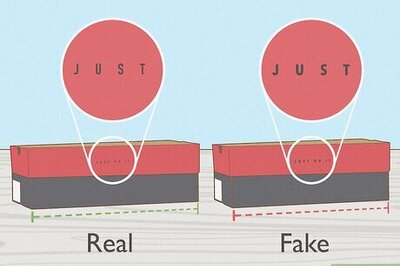
views
Eat more essential fatty acids (EFAs).

A diet high in EFAs can help prevent skin dryness and signs of aging. EFAs are important fats that our bodies need to function. Unfortunately, we can’t produce EFAs on our own, meaning we need to get them from our diet. Eating foods that contain EFAs may actually keep your skin more hydrated and supple, reduce inflammation caused by sun damage, and prevent premature thinning of the skin. Some foods that are high in EFAs include: Fish Walnuts Flax seeds Leafy green vegetables Vegetable oils
Load up on fruits and vegetables.

Fruits and vegetables are full of vitamins and antioxidants that are great for skin. Vitamins C, E, and D are critical for healthy skin, and antioxidants can actually help protect your skin from sun damage. Eating a healthy diet that’s full of vitamins and antioxidants can help prevent the signs of skin aging. One of the best ways to get more vitamins and antioxidants is to eat more fruits and vegetables. Aim to eat at least 1 ½-2 cups of fruit and 2-3 cups of vegetables every day. Some great antioxidant-rich options include: Berries, like blueberries, raspberries, blackberries, and strawberries Carrots Sweet potatoes Kale Spinach Red and green peppers Broccoli
Take collagen supplements.

Collagen supplements may help reduce the signs of skin aging. There are a lot of supplements out there that make questionable claims about preventing and reversing aging, but one type of supplement that may actually be effective is collagen. Although the research is preliminary, studies show that collagen supplements can improve skin elasticity and hydration. If you’re looking for a skin-boosting supplement that actually works, collagen might be it. Remember to talk to your doctor before you start taking any new supplements. You can find collagen supplements online and in most vitamin and health food stores. Follow the instructions on your supplements to make sure you're taking one full day's serving every day.
Try facial massage.
Massaging your face regularly may reduce puffiness and make your skin firmer. The idea behind facial massage is that it improves drainage in the face (making your face less puffy) and increases blood flow, which means more skin-boosting nutrients and collagen production. While you can book an appointment with a professional for a face massage, you can also do your own at home using your hands, a jade roller, or other face massaging tools on the market. To do your own facial massage at home using just your fingers, first apply face moisturizer or oil to lubricate your skin. Starting at the bottom of your face, use gentle but firm pressure to massage up toward your cheeks with your finger tips. Work your way up your face, then use just your ring fingers to massage around your eyes. Start at your brows and go around your eyes and down to the outer corners. Finish by tapping the skin on your forehead in an upward motion. Make it a habit to massage your face every day for the best results!
Exfoliate.
Exfoliating may reveal brighter, younger-looking skin. Exfoliation involves removing old, dead skin cells so your skin looks smoother, brighter, and more even. The two main types of exfoliation are mechanical, which involves using a brush, scrub, etc. to buff away dead skin, and chemical, which involves using acids to dissolve old skin cells. The best method for you depends on your skin type. If you have dry, sensitive, or acne-prone skin, use a mild-strength chemical exfoliator so you don’t irritate your skin. If you have oily skin, try mechanical exfoliation, or use a stronger chemical exfoliator. Exfoliate 2-3 times a week. If you have sensitive skin, cut that down to once a week. It’s tempting to exfoliate every day, but don’t do it—too much exfoliation can strip your skin of natural oils and cause inflammation that actually accelerates aging.
Moisturize.

Moisturizers hydrate your skin, making it look smoother and healthier. When you apply moisturizer to your skin, it acts as a barrier that prevents water loss. Moisturizers also replace important lipids and other compounds that keep your skin looking healthy and youthful. Dermatologists recommend moisturizing every day after washing your face or showering. Apply moisturizer to your face and body while your skin is still damp to lock in more moisture and give your skin a hydrated, youthful glow. Choose an oil-based moisturizer, preferably one that has petroleum jelly in it, for the best hydration. If you have oily skin, use a water-based moisturizer that's oil-free so it doesn't clog your pores. Use different moisturizers for your face and body. Body lotions are usually too heavy to use on your face. For your face, look for a moisturizer that’s specifically made for the skin on your face.
Be gentle with your skin.

Scrubbing, over-bathing, and harsh products can all worsen the signs of aging. When you wash your face and body, be gentle. Scrubbing and tugging can actually damage your skin and accelerate skin aging. You should also avoid washing with hot water and taking long showers and baths—these things strip your skin of its natural oils, causing dryness. Avoid washing with soaps that contain harsh detergents for the same reason. After you shower or wash your face, gently pat your skin dry, don’t rub. Your skin will thank you for it!
Wear sunscreen.

Sunscreen is a must to prevent more skin aging. If you’re not wearing sunscreen every day, you’re undoing all of the hard work you’re putting into caring for your skin. Sunscreen protects your skin from the sun’s harmful UV rays that cause premature aging. Dermatologists recommend using a sunscreen that is broad-spectrum (protects against all kinds of UV rays), at least SPF 30, and water-resistant. Make it a habit to wear sunscreen every day, even if you’re just out running errands. Remember to apply sunscreen to any exposed parts of your body, not just your face.
Take your makeup off before bed.

Sleeping with makeup can actually age your skin. You’re tired after a long day and the last thing you want to do is take off all of your makeup—we get it. But sleeping with makeup on not only increases your risk of breaking out, it also ages your skin and makes wrinkles worse. That’s because makeup trapped against your skin all night can lead to skin damage, a.k.a. aging. To keep your skin looking youthful and glowy, don’t skip removing your makeup at night. The way you apply your makeup can make a big difference in how youthful your skin looks too!
Exercise regularly.

Regular exercise may give your skin a more youthful glow. Exercise improves circulation throughout your body and boosts your immune system, which may actually improve the appearance of your skin. Plus, routine exercise is just great for you in general (it boosts your mood, lowers your risk of certain diseases, and increases your chances of living longer, to name a few benefits), so it’s a win-win all around. When it comes to exercise, here’s what doctors recommend for the average adult: At least 150-300 minutes of moderate aerobic exercise, or 75-150 minutes of vigorous aerobic exercise, per week. At least 2 days of strength-training per week.
Get enough sleep.

A healthy sleep schedule actually helps slow skin aging. If you’ve ever looked at yourself in the mirror after a night without much sleep, you know how much of a toll it can take on your appearance (we've all been there). Not getting enough sleep at night has been linked with increased signs of aging and worsened skin barrier function. To keep your skin looking healthy and youthful, try to get a full night’s sleep every night, or at least as often as possible. Most adults need at least 7 hours of sleep every night, although you may find you need more to wake up feeling really well-rested.
De-stress.

Chronic stress can actually age your skin. You may have heard that stress can cause breakouts, but regular stress can also accelerate skin aging. It’s not always easy, but try to find ways to de-stress throughout the week. Taking a time-out to meditate, do yoga, listen to music, or take some deep breaths whenever you’re feeling stressed can make a big difference. Exercising, getting enough sleep, and eating a healthy diet can also help with stress, and these things are all great for your skin in general as well. Struggling with stress? Check out our articles on stress management.
Avoid smoking.

Smoking makes your skin age faster. It worsens wrinkles and causes a dull, unhealthy complexion. The good news is that quitting smoking can stop your skin from aging as quickly and even reverse some of the visible damage. It comes with a whole host of other benefits too, like more energy, less stress, improved breathing, and a longer life expectancy, so it’s never too late to quit. Quitting smoking can be really hard, but it’s doable and worth it. Nicotine replacement therapy can make you twice as likely to succeed. Between nicotine patches, lozenges, gum, tablets, and nasal sprays that are all available over the counter, there are a lot of options to choose from nowadays.
Limit alcohol.

Frequently drinking too much alcohol can take a toll on your skin. That doesn’t mean you can’t enjoy your after-work glass of wine or a cold beer on the weekend, but regular heavy drinking (8 or more alcoholic drinks per week) does accelerate skin aging. Volume loss, puffiness, and an increase of visible blood vessels are just some of the aging effects caused by long-term heavy drinking. To avoid damaging your skin over time, try your best to only drink in moderation. The current dietary guidelines for Americans are no more than 1 drink per day for women and 2 drinks per day for men.













Comments
0 comment